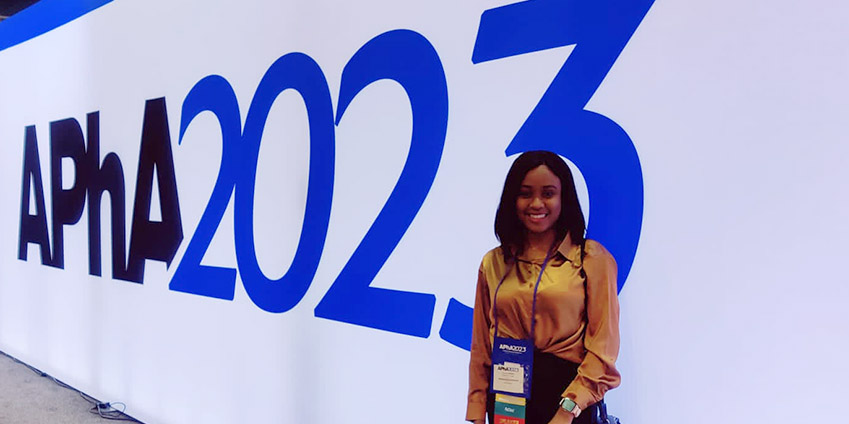Research News
Impact of Immunotherapy
Ph.D. Student Awarded APhA Best Podium Presentation for Study on Immune Checkpoint Inhibitors
April 19 — Melanoma is the most fatal type of skin cancer, with less than 20% of patients surviving longer than five years in its metastatic stage. Yet, the treatment now considered the standard of care – immunotherapy – continues to be underutilized among traditionally underserved patient populations, based on an award-winning study conducted by a University of Houston College of Pharmacy Ph.D. student.
Olajumoke Olateju, a student in the Pharmaceutical Health Outcomes and Policy Concentration of the Pharmaceutical Sciences doctoral degree program, was honored with the Best Podium Presentation Award at the American Pharmacists Association's 2023 Annual Meeting March 24-27 in Phoenix, Ariz., for her study into the trends and barriers to first-line treatment with immune checkpoint inhibitors (ICI).
"Even though it was a class project, I designed it as a rigorous study that would eventually be published, and that was the mindset I had right from the beginning," Olateju said. "Even when the course was over, we still went ahead and fine-tuned the analysis and wrote the manuscripts."
While chemotherapy is still the leading treatment for many cancers, immunotherapy has become mainstay therapy for some cancers, and became the first-line agent for metastatic melanoma in 2011. ICIs have controlled tumor regression in nearly 50% of these patients, as opposed to less than 10% before their discovery.
Qualified patients for the study were aged 18 and above, diagnosed with metastatic melanoma from June 2011 to December 2018, and identified in the Texas Cancer Registry Database.
The results found that the utilization of immunotherapy increased among all 1,765 patients, but the Average Annual Percent Change was specifically higher in women, whites, patients with private insurance, and those with no known comorbidity.
However, in patients with increasing age, decreasing financial resources, with government insurance or no insurance, and with comorbidities, the likelihood of immunotherapy utilization was lower. The study concluded that a patient’s socioeconomic status can act as a barrier when attempting to utilize immunotherapy.
"Disparities in access to treatment has been a long-standing issue in cancer management," Olateju said. "It was one of the things that motivated me to do the study because Texas represents one of the states that has yet to expand Medicaid eligibility, which means that we have a large proportion of uninsured patients in the state."
Olateju noted that expanding Medicaid eligibility would result in a lower proportion of patients lacking access to the advanced treatment.
"That's the beauty of public health because you can look at the effect of policies on population health, and that was something that we found in the results," Olateju said.
Co-authors of the study include fellow UHCOP Ph.D. student Zhen Zeng and UHCOP faculty members E. James Essien, M.D., DrPH, Osaro Mgbere, Ph.D., M.S., MPH, and Douglas Thornton, Ph.D., Pharm.D.
— Logan Linder
